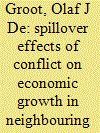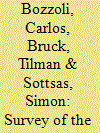| Srl | Item |
| 1 |
ID:
095043


|
|
|
|
|
| Publication |
2010.
|
| Summary/Abstract |
Empirical evidence on the effect of defense spending on US output is at best mixed. Against this backdrop, this paper assesses the impact of a positive defense spending shock on the growth rate of real GNP using a Factor Augmented Vector Autoregressive (FAVAR) model estimated with 116 variables spanning the quarterly period of 1976:01 to 2005:02. Overall, the results show that a positive shock to the growth rate of the real defense spending translates to a positive short-run effect on the growth rate of real GNP lasting up to ten quarters, but the effect is significant only for two quarters. Beyond the tenth quarter, the effect becomes negative and shows signs of slow reversal at around the 17th quarter. Our results tend to indicate that the mixed empirical evidence, based on small-scale Vector Autoregressive (VAR) and Vector Error Correction (VEC) models, could be a result of a small information set not capturing the true theoretical relationships between the two variables of interest.
|
|
|
|
|
|
|
|
|
|
|
|
|
|
|
|
| 2 |
ID:
095046


|
|
|
|
|
| Publication |
2010.
|
| Summary/Abstract |
The traditional view of the defence industry obtaining large profits from contracts with the Ministry of Defence relies on several assumptions. Among these are the use of such arrangements as an instrument of industrial policy, the strong market power enjoyed by prime contractors, and the inefficiency encouraged by the sector. The findings show that defence contracts have a positive effect on profits, as well as the prizes for innovation and the market power enjoyed by some defence subsectors.
|
|
|
|
|
|
|
|
|
|
|
|
|
|
|
|
| 3 |
ID:
095047


|
|
|
|
|
| Publication |
2010.
|
| Summary/Abstract |
The present article aims at investigating the causal relationship between defense spending and terrorism in Turkey using the Autoregressive Distributed Lag (ARDL) bounds testing procedure and Granger-causality analysis. The findings reveal that there exists a unidirectional causality running form terrorist attacks to defense spending as expected, but not vice versa. In the light of this finding it can be inferred that military anti-terrorism measures alone are not sufficient to prevent terrorism.
|
|
|
|
|
|
|
|
|
|
|
|
|
|
|
|
| 4 |
ID:
095044


|
|
|
|
|
| Publication |
2010.
|
| Summary/Abstract |
In this article, the influence of conflict on the economies of neighbouring countries is discussed. The results from previous papers show a strong negative effect for an entire area around a country suffering from conflict, but this paper reaches a different conclusion, by using more recent data and adjusting the methodology previously employed. Additionally, a new type of contiguity matrix is constructed and used in the actual analysis. The final analysis consists of a large number of regressions and concludes that conflict actually has two opposing effects. First, like conflict countries themselves, directly contiguous countries actually suffer from the negative effects of proximate conflict. Secondly, however, there is also a positive spillover of conflict, which affects non-contiguous countries and this effect is larger for countries that are closer to the conflict country. The results from the paper predominantly hold for the most violent kind of conflict.
|
|
|
|
|
|
|
|
|
|
|
|
|
|
|
|
| 5 |
ID:
095045


|
|
|
|
|
| Publication |
2010.
|
| Summary/Abstract |
This paper defines the global economic costs of conflict and suggests two key criteria, namely comprehensiveness and consistency, which are necessary for a valid calculation of such costs. A critical review of the literature reveals that most studies focus on national income losses, using counterfactual regression models, finding a negative impact on growth both for conflict countries themselves and for their neighbors. However, the debate is quite fragmented and the literature fails to combine these insights in a comprehensive and consistent manner. Furthermore, there is little work thus far on integrating aggregate and micro-level estimates of the costs of conflict.
|
|
|
|
|
|
|
|
|
|
|
|
|
|
|
|